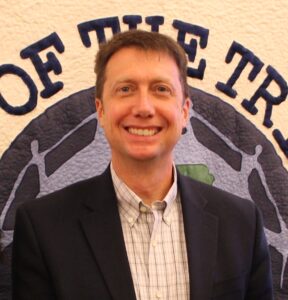 For nearly 20 years, the Rev. Dr. Michael Wilson served in a pastoral role. What he learned during those two decades of service was that he and other pastors needed support. That’s why, when an opportunity to do just that – support pastors and their work – came Michael’s way, he jumped at the chance to serve in that role.
For nearly 20 years, the Rev. Dr. Michael Wilson served in a pastoral role. What he learned during those two decades of service was that he and other pastors needed support. That’s why, when an opportunity to do just that – support pastors and their work – came Michael’s way, he jumped at the chance to serve in that role.
It was in 2016, which came on the heels of a 15-year pastorate at Chestnut Level Presbyterian Church in Quarryville, PA, that Michael decided to answer a call to become the stated clerk of the Presbytery of Donegal where he was (and still is) a minister member. It was an easy move to make.
“To me, the work of stated clerk at the presbytery level is primarily around supporting pastors and clerks of session in their leadership and helping them figure out processes that support their ministries,” he said. “And I enjoy doing that.”
Michael’s enjoyment of stated clerk duties has caried over to another mid council opportunity for him. On Jan. 1, he began filling this role at the Synod of the Trinity, replacing the Rev. Dr. Wayne Yost, who retired Dec. 31 after nine years as the Synod clerk.
“It’s a good fit for my gifts, personality and sense of call,” Michael said. “I love congregations. I loved congregational ministry. I loved being a pastor. I think that congregations are the front end of ministry and that the most important thing we can do as a denomination is to have vital congregations.
“As a stated clerk of a presbytery, I love supporting congregations and I felt really supported by the Synod. I’m grateful for the Synod in their support of that work (at Donegal).”
One way the Synod supported Michael’s work at Donegal, where he remains at three-quarter time while serving another quarter time at the Synod, was through coaching. Former Synod executive the Rev. Bruce Stevens was a mentor to Michael while he served at Chestnut Level.
“There I was, directly supported by the Synod as a pastor and then certainly supported by the then-staff of the Synod as a presbytery stated clerk,” he continued. “So, when Wayne announced his retirement, I started to wonder if it was the time for me to step up to say let me do this work to support other presbytery stated clerks and other presbyteries.”
Michael’s path to a stated clerk call at the Presbytery of Donegal is not unlike others who have gone before him. In fact, he is the third pastor at Chestnut Level in the last roughly 60 years to also serve as the stated clerk of the presbytery.
“Maybe there’s something in the water at Chestnut Level?” Michael said with a chuckle. “Maybe there’s something about the pastor they call that turns out to have that kind of personality.”

Michael Wilson’s family, from left after Michael, includes Clint, Tricia, Emma, Julia and the dog, Brom.
Michael had been involved in Synod work prior to becoming its stated clerk, having served on the Synod’s Budget & Finance Advisory Team as well as being the clerk for its Permanent Judicial Commission. He has also served as the treasurer for the Association of Mid Council Leaders for six years, giving him an even greater awareness and appreciation for the work of synods in the Presbyterian Church (U.S.A.) denomination.
All of this background has given him a good perspective of what is needed in the region and a road map to try to accomplish that.
“I think we’re going through a tumultuous time in the life of many of our congregations and our presbyteries,” Michael said. “On a personal level, part of my goal will be to support the stated clerks of the presbyteries as they live through a lot of changes in their presbyteries and as they support congregations that are going through a lot of changes.”
Declines in membership have made mid council work challenging, and with more and more churches closing their doors because of a lack of funding and support, it requires emotional, spiritual and grief work that will be needed by those around them. There is also a time to think about the future and the hope that is in that, all work that Michael is excited to dig into when the situation arises.
Aside from being a stated clerk at two mid councils, Michael also has two doctorate degrees, with his latest (a Ph.D.) coming at Vrije Universiteit, Amsterdam. A teacher of polity and leadership courses at Lancaster Theological Seminary, Michael decided to do a second doctorate (his first was a Doctor of Ministry that he completed in 2008) to help him in his work with theological education. He traveled to the Netherlands in November to give his dissertation defense on working to think theologically and historically about polity and decision-making.
“I decided to work on the theology and history of decision-making in Presbyterianism and more broadly the Reformed tradition,” he said. “Oftentimes when you read history, what you read are about the decisions that were made. I tried to do some research into how people made those decisions, and there hasn’t been much work done on that historically.
“I ended up recognizing that our primary decision-making procedure – Robert’s Rules of Order – brings with it a lot of strength and also in my estimation some significant limitations in terms of working together creatively, collaboratively and also cohesively. I sometimes say, when we’re at our best, we’re not following our rules very closely. When we’re following our rules really closely, we’re often not at our best.”
He gave an example of a congregation taking a vote and getting 55 percent of the congregation in favor of constructing a building and securing a mortgage. Polity says that a majority vote would allow for this congregation to go forward with the plan, but reality implies that if 45 percent of the people are against the idea it may not be a wise decision because it would result in a split in the congregation.
These studies and the background that Michael has gained will bode well for him and the mid councils he serves going forward. How long he’ll be in these rolls even he doesn’t know, but what he does know is that it just feels right.
“I am surprised to feel as called to this as I do,” he said of being the Synod stated clerk. “I’m excited to work with the staff. I have known Forrest (Claassen, current Synod executive) since seminary although we have never been professional colleagues until now. I feel very called to this position and I look forward to working with the amazing staff of the Synod.”
